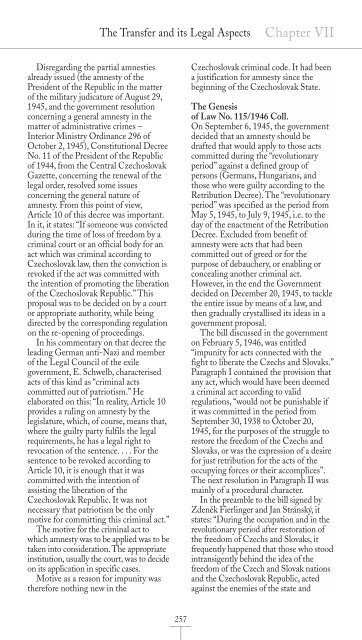the nationality of all inhabitants of the czech provinces and ...
the nationality of all inhabitants of the czech provinces and ...
the nationality of all inhabitants of the czech provinces and ...
You also want an ePaper? Increase the reach of your titles
YUMPU automatically turns print PDFs into web optimized ePapers that Google loves.
Disregarding <strong>the</strong> partial amnesties<br />
already issued (<strong>the</strong> amnesty <strong>of</strong> <strong>the</strong><br />
President <strong>of</strong> <strong>the</strong> Republic in <strong>the</strong> matter<br />
<strong>of</strong> <strong>the</strong> military judicature <strong>of</strong> August 29,<br />
1945, <strong>and</strong> <strong>the</strong> government resolution<br />
concerning a general amnesty in <strong>the</strong><br />
matter <strong>of</strong> administrative crimes –<br />
Interior Ministry Ordinance 296 <strong>of</strong><br />
October 2, 1945), Constitutional Decree<br />
No. 11 <strong>of</strong> <strong>the</strong> President <strong>of</strong> <strong>the</strong> Republic<br />
<strong>of</strong> 1944, from <strong>the</strong> Central Czechoslovak<br />
Gazette, concerning <strong>the</strong> renewal <strong>of</strong> <strong>the</strong><br />
legal order, resolved some issues<br />
concerning <strong>the</strong> general nature <strong>of</strong><br />
amnesty. From this point <strong>of</strong> view,<br />
Article 10 <strong>of</strong> this decree was important.<br />
In it, it states: “If someone was convicted<br />
during <strong>the</strong> time <strong>of</strong> loss <strong>of</strong> freedom by a<br />
criminal court or an <strong>of</strong>ficial body for an<br />
act which was criminal according to<br />
Czechoslovak law, <strong>the</strong>n <strong>the</strong> conviction is<br />
revoked if <strong>the</strong> act was committed with<br />
<strong>the</strong> intention <strong>of</strong> promoting <strong>the</strong> liberation<br />
<strong>of</strong> <strong>the</strong> Czechoslovak Republic.” This<br />
proposal was to be decided on by a court<br />
or appropriate authority, while being<br />
directed by <strong>the</strong> corresponding regulation<br />
on <strong>the</strong> re-opening <strong>of</strong> proceedings.<br />
In his commentary on that decree <strong>the</strong><br />
leading German anti-Nazi <strong>and</strong> member<br />
<strong>of</strong> <strong>the</strong> Legal Council <strong>of</strong> <strong>the</strong> exile<br />
government, E. Schwelb, characterised<br />
acts <strong>of</strong> this kind as “criminal acts<br />
committed out <strong>of</strong> patriotism.” He<br />
elaborated on this: “In reality, Article 10<br />
provides a ruling on amnesty by <strong>the</strong><br />
legislature, which, <strong>of</strong> course, means that,<br />
where <strong>the</strong> guilty party fulfils <strong>the</strong> legal<br />
requirements, he has a legal right to<br />
revocation <strong>of</strong> <strong>the</strong> sentence. ...For <strong>the</strong><br />
sentence to be revoked according to<br />
Article 10, it is enough that it was<br />
committed with <strong>the</strong> intention <strong>of</strong><br />
assisting <strong>the</strong> liberation <strong>of</strong> <strong>the</strong><br />
Czechoslovak Republic. It was not<br />
necessary that patriotism be <strong>the</strong> only<br />
motive for committing this criminal act.”<br />
The motive for <strong>the</strong> criminal act to<br />
which amnesty was to be applied was to be<br />
taken into consideration. The appropriate<br />
institution, usu<strong>all</strong>y <strong>the</strong> court, was to decide<br />
on its application in specific cases.<br />
Motive as a reason for impunity was<br />
<strong>the</strong>refore nothing new in <strong>the</strong><br />
The Transfer <strong>and</strong> its Legal Aspects<br />
257<br />
Chapter VII<br />
Czechoslovak criminal code. It had been<br />
a justification for amnesty since <strong>the</strong><br />
beginning <strong>of</strong> <strong>the</strong> Czechoslovak State.<br />
The Genesis<br />
<strong>of</strong> Law No. 115/1946 Coll.<br />
On September 6, 1945, <strong>the</strong> government<br />
decided that an amnesty should be<br />
drafted that would apply to those acts<br />
committed during <strong>the</strong> “revolutionary<br />
period” against a defined group <strong>of</strong><br />
persons (Germans, Hungarians, <strong>and</strong><br />
those who were guilty according to <strong>the</strong><br />
Retribution Decree). The “revolutionary<br />
period” was specified as <strong>the</strong> period from<br />
May 5, 1945, to July 9, 1945, i.e. to <strong>the</strong><br />
day <strong>of</strong> <strong>the</strong> enactment <strong>of</strong> <strong>the</strong> Retribution<br />
Decree. Excluded from benefit <strong>of</strong><br />
amnesty were acts that had been<br />
committed out <strong>of</strong> greed or for <strong>the</strong><br />
purpose <strong>of</strong> debauchery, or enabling or<br />
concealing ano<strong>the</strong>r criminal act.<br />
However, in <strong>the</strong> end <strong>the</strong> Government<br />
decided on December 20, 1945, to tackle<br />
<strong>the</strong> entire issue by means <strong>of</strong> a law, <strong>and</strong><br />
<strong>the</strong>n gradu<strong>all</strong>y cryst<strong>all</strong>ised its ideas in a<br />
government proposal.<br />
The bill discussed in <strong>the</strong> government<br />
on February 5, 1946, was entitled<br />
“impunity for acts connected with <strong>the</strong><br />
fight to liberate <strong>the</strong> Czechs <strong>and</strong> Slovaks.”<br />
Paragraph I contained <strong>the</strong> provision that<br />
any act, which would have been deemed<br />
a criminal act according to valid<br />
regulations, “would not be punishable if<br />
it was committed in <strong>the</strong> period from<br />
September 30, 1938 to October 20,<br />
1945, for <strong>the</strong> purposes <strong>of</strong> <strong>the</strong> struggle to<br />
restore <strong>the</strong> freedom <strong>of</strong> <strong>the</strong> Czechs <strong>and</strong><br />
Slovaks, or was <strong>the</strong> expression <strong>of</strong> a desire<br />
for just retribution for <strong>the</strong> acts <strong>of</strong> <strong>the</strong><br />
occupying forces or <strong>the</strong>ir accomplices”.<br />
The next resolution in Paragraph II was<br />
mainly <strong>of</strong> a procedural character.<br />
In <strong>the</strong> preamble to <strong>the</strong> bill signed by<br />
Zdeněk Fierlinger <strong>and</strong> Jan Stránský, it<br />
states: “During <strong>the</strong> occupation <strong>and</strong> in <strong>the</strong><br />
revolutionary period after restoration <strong>of</strong><br />
<strong>the</strong> freedom <strong>of</strong> Czechs <strong>and</strong> Slovaks, it<br />
frequently happened that those who stood<br />
intransigently behind <strong>the</strong> idea <strong>of</strong> <strong>the</strong><br />
freedom <strong>of</strong> <strong>the</strong> Czech <strong>and</strong> Slovak nations<br />
<strong>and</strong> <strong>the</strong> Czechoslovak Republic, acted<br />
against <strong>the</strong> enemies <strong>of</strong> <strong>the</strong> state <strong>and</strong>


